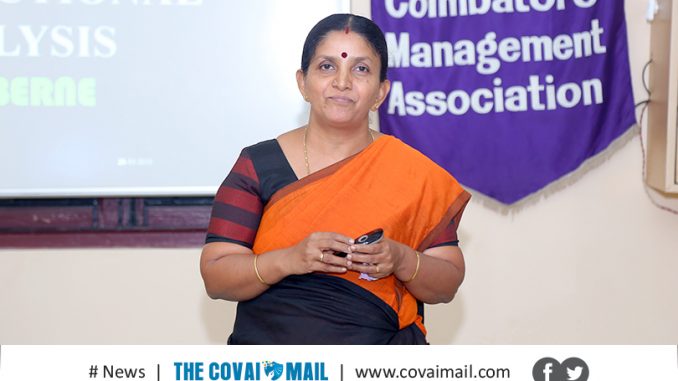
How will you feel if a very young colleague of yours, who has none of your experience, calls you by the name in the office? A vast section would become angry. Normally all conventional people would feel offended. What happens here is a spike in our ego state. Dr.S.Sujatha, Associate Professor from Guruvayurappan Institute of Management was the speaker at the latest edition of Coimbatore Management Association’s ‘Monday Musings’. Her lecture highlighted about the Ego states in a human’s personality and how,by maintaining our ego states, we could improve our personal and professional relationships.

Sujatha said there are three different ego states; Parent, Adult and Child. Parent ego state is all knowing, dominant, advising, and most of the attributes of it is taught to a person. Adult ego state wants to know everything, it craves for knowledge and it demands proof & logic. Child Ego State is cheerful, unconcerned and submissive. When we talk or take part in a conversation, our mind resides in these ego states. We will feel offended when a colleague calls us by our name whereas when our own child calls us like that, we experience joy and not anger. Our ego state goes to a child level when we want it to and stays in the parent level when we are in a professional atmosphere.
When there is a crisis in the office, the ego state of the employers remains in parent level making him order with authority. If the employees too exhibit a parent level ego state, then it will create friction. “Altering our ego state will avert an unnecessary argument”, suggested Sujatha. When a person asks for a favor, he asks from his adult ego state, and he is expecting an answer to originate from the adult ego state of the replier. If the replier speaks from a parent level; for instance if he says “Why do you ask me to do a favor? Why don’t you do it on your own?” this will never help the conversation go anywhere positive.
At times like this, complementing like an adult will make the conversation and the relationship a productive one. Sujatha further said that parent ego state has two subsets; critical parent ego state and nurturing parent ego state. The former criticizes while the latter exhibits empathy. It is not always possible to be in a specific ego state so when we shift our egos, we smoothen our relationship. The speaker suggested the gathering to evaluate the situation and alter our ego states accordingly.
